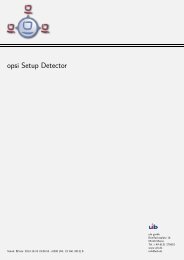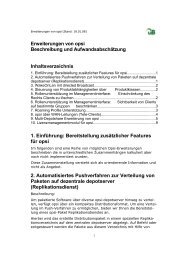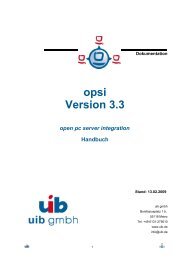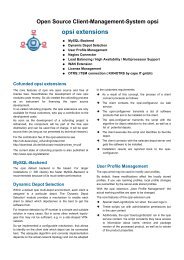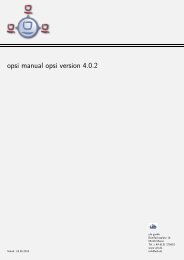opsi Version 3.3.1 - opsi Download - uib
opsi Version 3.3.1 - opsi Download - uib
opsi Version 3.3.1 - opsi Download - uib
You also want an ePaper? Increase the reach of your titles
YUMPU automatically turns print PDFs into web optimized ePapers that Google loves.
6. <strong>opsi</strong>-Module: depot server<br />
Lines with configuration instructions are terminated by a semicolon (;). Empty lines are<br />
allowed. Comments begin with a hash(#) (the „host description“, an additional<br />
description for the PC in front of the host name, is realized in the same way.).<br />
At the beginning of the '/etc/dhcp3/dhcpd.conf' are some general parameters. In the<br />
second part the entries for subnets, groups and hosts are located. A hierarchical<br />
grouping of clients can be done by enclosing entries (e. g. subnet and group) with curly<br />
brackets. The defaults of a block refer to all elements within this block.<br />
General parameters / example<br />
PC-specific entries<br />
# Sample configuration file for ISC dhcpd for Debian<br />
# also answer bootp questions<br />
allow bootp;<br />
The network protocol bootp is supported.<br />
A DHCP-configuration file must have at least one subnet definition. Everything defined<br />
within the brackets is valid for all hosts or groups of that subnet.<br />
By the element 'group' groups of computers can be defined, which have common<br />
parameters (so the common parameters do not have to be defined for every client).<br />
If different instructions are set on different levels, then the innermost definition<br />
overwrites the outer one.<br />
Example<br />
subnet{<br />
.....<br />
group{<br />
.....<br />
host{<br />
.....<br />
}<br />
}<br />
}<br />
# Server Hostname<br />
100



